Lecture 7 Summary
- 格式:ppt
- 大小:424.50 KB
- 文档页数:21


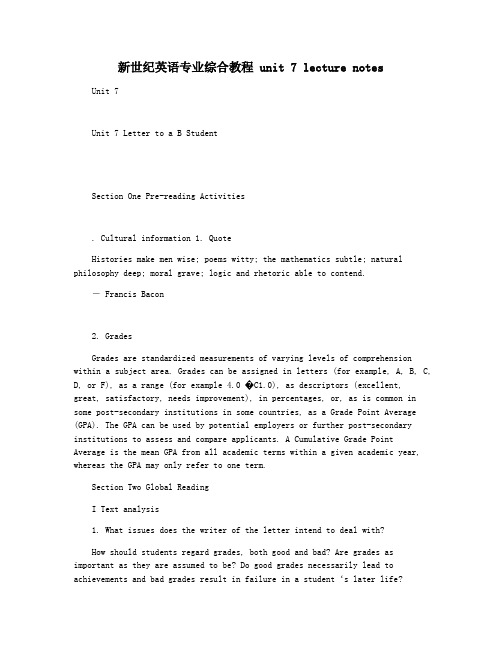
新世纪英语专业综合教程 unit 7 lecture notesUnit 7Unit 7 Letter to a B StudentSection One Pre-reading Activities. Cultural information 1. QuoteHistories make men wise; poems witty; the mathematics subtle; natural philosophy deep; moral grave; logic and rhetoric able to contend.― Francis Bacon2. GradesGrades are standardized measurements of varying levels of comprehension within a subject area. Grades can be assigned in letters (for example, A, B, C, D, or F), as a range (for example 4.0 �C1.0), as descriptors (excellent, great, satisfactory, needs improvement), in percentages, or, as is common in some post-secondary institutions in some countries, as a Grade Point Average (GPA). The GPA can be used by potential employers or further post-secondary institutions to assess and compare applicants. A Cumulative Grade PointAverage is the mean GPA from all academic terms within a given academic year, whereas the GPA may only refer to one term.Section Two Global ReadingI Text analysis1. What issues does the writer of the letter intend to deal with?How should students regard grades, both good and bad? Are grades as important as they are assumed to be? Do good grades necessarily lead to achievements and bad grades result in failure in a student‘s later life?2. What‘s the theme of this piece of writing?It is explicitly stated in the first sentence of the third paragraph: to put a B student‘s disappointment in perspective by considering exactly what the grade B means and doesn‘t mean.II Structural analysis1. Divide the text into parts by completing the table. Paragraphs 1 2-5 6-8 9-10 Grades do not mean everything. Getting a B in class does not mean one will always be a B performer in life. In a complex society like ours, labels are necessary but they should be kept in perspective. Main idea It introduces the topic of the letter.2. Apart from the first paragraph, the rest of the text falls clearly into three parts, each of which is marked at the beginning by a key word or words. Try to find these key words. Paragraphs 2�C5: Disappointment1Unit 7Paragraphs 6-8: The student as performer; the student as human being. Paragraphs 9-10: PerspectiveSection Three Detailed ReadingText ILetter to a B StudentRobert Oliphant1Your final grade for the course is B. A respectable grade. Far superior to the “Gentleman’s C” that served as the norm a couple of generations ago. But in those days A’s were rare: only two out of twenty-five, as I recall. Whatever our norm is, it has shifted upward, with the result that you are probably disappointed at not doing better. I’m certain that nothing I can say will remove that feeling of disappointment, particularly in a climate where grades determine eligibility for graduate school and special programs.1Disappointment. It’s the stuff bad dreams are made of: dreams of failure, inadequacy, loss of position and good repute. The essence of success is that there’s never enough of it to go round in a zero-sum game2 where one person’s winning must be offset by another’s losing, one person’s joyoffset by another’s disappointment.2 You’ve grown up in a society where winning is not the most important thing ― it’s the only thing.3 To lose, to fail, to go under, to go broke ― these are deadly sins in a world where prosperity in the present is seen as a sure sign of salvation in the future. In a different society, your disappointment might be something you could shrug away. But not in ours.4My purpose in writing you is to put your disappointment in perspective by considering exactly what your grade means and doesn’t mean. I do not propose to argue here that grades are unimportant. Rather, I hope to show you that your grade, taken at face value, is apt to be dangerously misleading, both to you and to others.As a symbol on your college transcript, your grade simply means that you have successfully completed a specific course of study, doing so at a certain level of proficiency. The level of your proficiency has been determined by your performance of rather conventional tasks: taking tests, writing papers and reports, and so forth. Your performance is generally assumed to correspond to the knowledge you have acquired and will retain. But this assumption, as we both know, is questionable; it may w ell be that you’ve actually gotten much more out of the course than your grade indicates ― or less. Lacking more precise measurement tools, we must interpret your B as a rather fuzzy symbol at best, representing a questionable judgment of your mastery of the subject.Your grade does not represent a judgment of your basic ability or of your character. Courage, kindness, wisdom, good humor ― these are the important characteristics of our species. Unfortunately they are not part of our curriculum. But they are important: crucially so, because they are always in short supply. If you value these characteristics in yourself, you will be valued ― and far more so than those whose identities are measured only by little marks on a piece of paper. Your B is a price tag on a garment that is quite separate from the living, breathing human being underneath.The student as performer; the student as human being. The distinction is one we223456Unit 778910should always keep in mind. I first learned it years ago when I got out of the service5 and went back to college. There were a lot of us then: older than the norm, in a hurry to get our degrees and move on, impatient with the tests and rituals of academic life. Not an easy group to handle.One instructor handled us very wisely, it seems to me. On Sunday evenings in particular, he would make a point of stopping in at a local bar frequented by many of the GI-Bill students. There he would sit and drink, joke, and swap stories with men in his class, men who had but recently put away their uniforms and identities: former platoon sergeants, bomber pilots, corporals, captains, lieutenants, commanders, majors ― even a lieutenant colonel,6 as I recall. They enjoyed his company greatly, as he theirs. The next morning he would walk into class and give these same men a test. A hard test. A test on which he usually flunked about half of them.Oddly enough, the men whom he flunked did not resent it. Nor did they resent him for shifting suddenly from a friendly gear to a coercive one.7 Rather, they loved him, worked harder and harder at his course as the semester moved along, and ended up with a good grasp of his subject ― economics. The technique is still rather difficult for me to explain; but I believe it can be described as one in which a clear distinction was made between the student asclassroom performer and the student as human being. A good distinction to make.A distinction that should put yourB in pers pective ― and your disappointment.Perspective. It is important to recognize that human beings, despite differences in class and educational labeling, are fundamentally hewn from the same material and knit together by common bonds of fear and joy, suffering and achievement. Warfare, sickness, disasters public and private ― these are the larger coordinates of life. To recognize them is to recognize that sociallabels are basically irrelevant and misleading.8 It is true that these labels are necessary in the functioning of a complex society as a way of letting us know who should be trusted to do what, with the result that we need to make distinctions on the basis of grades, degrees, ranks, and responsibility. But these distinctions should never be taken seriously in human terms, either inthe way we look at others or in the way we look at ourselves.Even in achievement terms, your B label does not mean that you are permanently defined as a B achievement person. I’m well aware that B students tend to get B’s in the courses they take later on, just as A students tend to get A’s. But academic work is a narrow, neatly defined highway compared tothe unmapped rolling country your will encounter after you leave school. What you have learned may help you find your way about at first; later on you will have to shift to yourself, locating goals and opportunities in the same fogthat hampers us all as we move toward the future.Paragraph 1 Questions1. What change about grades has the author mentioned briefly?The author has mentioned briefly the change in the way grades are regarded, i.e. the norm has shifted upward.2. What, according to the author, has caused the feeling of disappointment?It has to do with the general social climate where grades determine eligibility for graduate3Unit 7school and special programs. This is why the author says there is nothing he can do to remove the feeling of disappointment.3. Has the author stated his purpose of writing in this paragraph? If yes, what is it? If not, where is it stated in the text?The purpose of writing the letter is not stated in this paragraph. It is not specifically mentioned until the third paragraph.Words and Expressions1. norm n.1) an accepted standard or a way of behaving or doing things that most people agree with e.g. You must adapt to the norms of the society you live in.2) the norm = a situation or type of behavior that is expected and considered to be typical e.g. One child per family is fast becoming the normin some countries. Derivation: normal a. normally ad. normalize v. normalization n.2. shift vt.& vi.1) to (cause something or someone to) move or change from one position or direction to another, especially slightlye.g. She shifted (her weight) uneasily from one foot to the other.The wind is expected to shift (to the east) tomorrow. 2) transfer sth.e.g. This simply shifts the cost of medical insurance from the employer to the employee. Collocation:shift sth. (from A to / onto B) 转移或转换某事物 shift (your) ground (辩论中)改变立场或方法e.g. He‘s annoying to argue with because he keeps shifting his ground. Derivation: shift n. shiftless a. Translation:1. 教师让学生们挪动了教室里的椅子,以便小组成员坐在一起开展讨论。

专八听力Mini-lecture技巧专八听力Mini-lecture技巧大全引导语:专八考试中最难的便是mini-lecture,时间长不说,还不提前发卷。
下面店铺为大家带来一些mini-lecture技巧,希望能够帮助大家更好的去备考。
第一章:记什么1.抓主题,记实词专八听力讲座文章通常采用总-分-总的结构,因此显得中心突出,结构清晰,层次分明。
此外,开头主题、分论点或结论句中出现的关键性名词、动词、形容词等,或对某一事物特点的描述以及分述各点时的细节描述性词汇都是表达信息的主要载体。
2.表示顺序或层次的词句后是要点由于记笔记填空的材料总体来说结构清晰,因而常出现表示层次或顺序的词、词组、句子来帮助理解文章。
这类表达有:first of all, …/the second point, …/thirdly,…/Now, let’s take a look at the first point,…等等。
听音时,应对这些表达之后的信息予以注意和记录。
3.表示总结的词句后是要点记笔记填空结构层次比较清晰,因此在开始叙述和完成叙述时,通常会出现总结性或总括性的词句。
历年考题中经常出现的表示总结的结构有:to sum up, in summary, to summarize, in a word, generally speaking, finally, in general, in the end, to conclude, in conclusion, in brief, in closing, it can be concluded that…, to draw the conclusion, above all, on the whole, in short等。
4.表示强调、重申的词句后是要点文章通常不会对关键或主要的概念和观点只提一次,而会重复或多次强调说明,以突出重点信息,让听者能理解要点,从而正确理解整个讲座的内容。
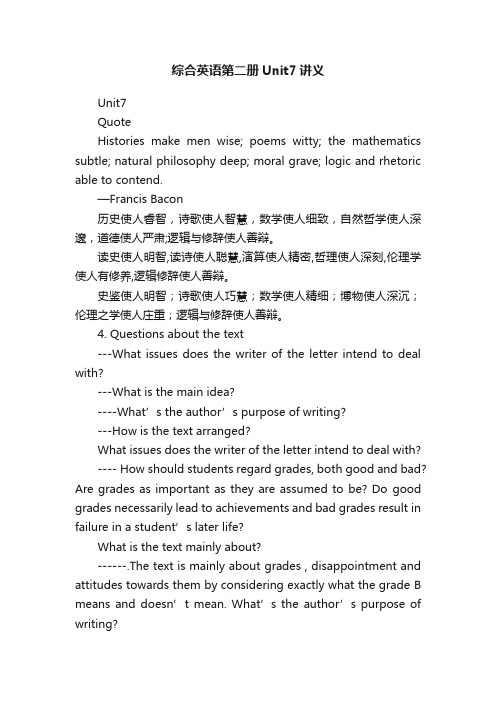
综合英语第二册Unit7讲义Unit7QuoteHistories make men wise; poems witty; the mathematics subtle; natural philosophy deep; moral grave; logic and rhetoric able to contend.—Francis Bacon历史使人睿智,诗歌使人智慧,数学使人细致,自然哲学使人深邃,道德使人严肃;逻辑与修辞使人善辩。
读史使人明智,读诗使人聪慧,演算使人精密,哲理使人深刻,伦理学使人有修养,逻辑修辞使人善辩。
史鉴使人明智;诗歌使人巧慧;数学使人精细;博物使人深沉;伦理之学使人庄重;逻辑与修辞使人善辩。
4. Questions about the text---What issues does the writer of the letter intend to deal with?---What is the main idea?----What’s the author’s purpose of writing?---How is the text arranged?What issues does the writer of the letter intend to deal with?---- How should students regard grades, both good and bad? Are grades as important as they are assumed to be? Do good grades necessarily lead to achievements and bad grades result in failure in a student’s later life?What is the text mainly about?------.The text is mainly about grades , disappointment and attitudes towards them by considering exactly what the grade B means and doesn’t mean. What’s the author’s purpose of writing?----to tell his student that he should view his grades and his disappointment correctly.What type of writing is this essay?-----argumentation.Apart from the first paragraph, the rest of the text falls clearly into three parts, each of which is marked at the beginning by a key word or words. Try to find these key words.----Paragraphs 2–5:Disappointment-----Paragraphs 6-8:The student as performer; the student as human being.-----Paragraphs 9-10:PerspectivePart 1 (paragraph 1)Understanding the paragraph:1) What does this part mainly talk about?2) What change about grades has the author mentioned briefly?3)What, according to the author, has caused the feeling of disappointment?4) Has the author stated his purpose of writing in this paragraph? If yes, what is it? If not, where is it stated in the text?Main idea of this part:It introduces the topic of the letter: grade B for the course and the feeling of disappointment.What change about grades has the author mentioned briefly?----The author has mentioned briefly the change in the way grades are regarded, i.e. the norm has shifted upward.What, according to the author, has caused the feeling of disappointment?-----It has to do with the general social climate where grades determine eligibility for graduate school and special programs. This is why the author says there is nothing he can do to remove the feeling of disappointment.Has the author stated his purpose of writing in this paragraph? If yes, what is it? If not, where is it stated in the text?----- The purpose of writing the letter is not stated in this paragraph. It is not specifically mentioned until the third paragraph.I’m certain that nothing I can say will remove that fe eling of disappointment, particularly in a climate where grades determine eligibility for graduate school and special program. (Paragraph 1)Translation:我肯定无论我说什么都不会消除你的沮丧心情,特别是在我们生活的环境中,考试分数直接决定你是否有资格读研究生和申请一些特别的学习项目。
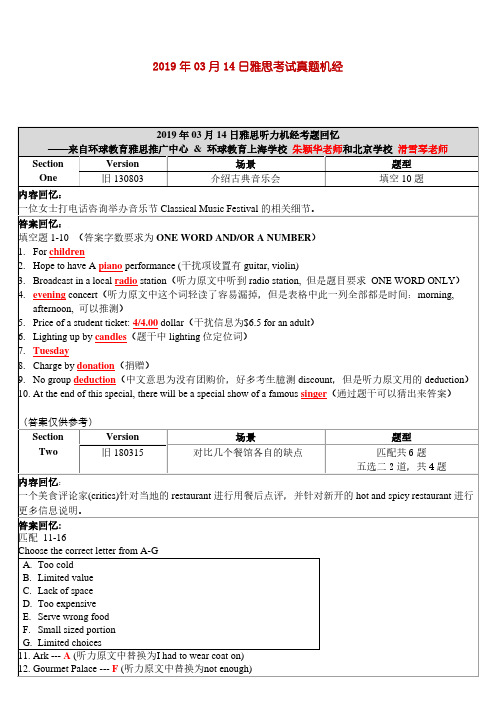
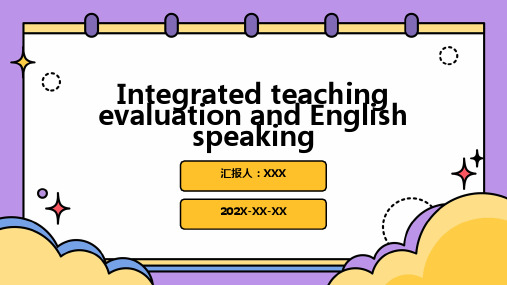
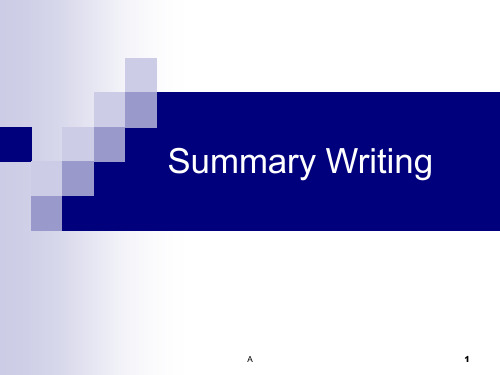
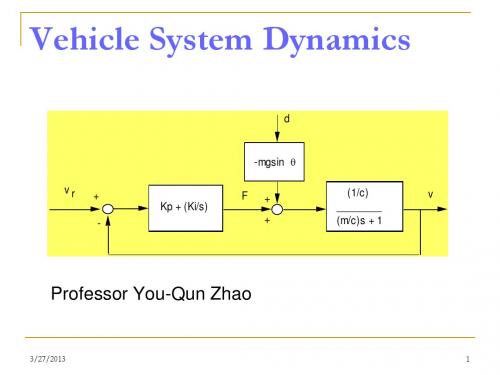

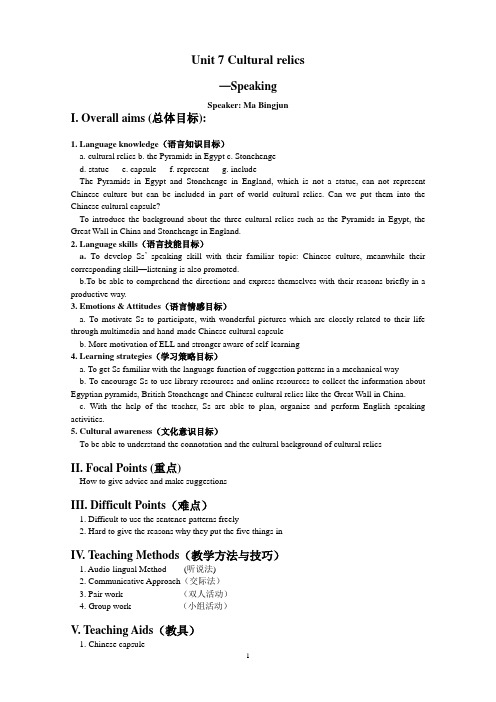
Unit 7 Cultural relics—SpeakingSpeaker: Ma BingjunI. Overall aims (总体目标):1. Language knowledge(语言知识目标)a. cultural relicsb. the Pyramids in Egyptc. Stonehenged. statuee. capsulef. representg. includeThe Pyramids in Egypt and Stonehenge in England, which is not a statue, can not represent Chinese culture but can be included in part of world cultural relics. Can we put them into the Chinese cultural capsule?To introduce the background about the three cultural relics such as the Pyramids in Egypt, the Great Wall in China and Stonehenge in England.2. Language skills(语言技能目标)a.To develop Ss’speaking skill with their familiar topic: Chinese culture, meanwhile their corresponding skill—listening is also promoted.b.To be able to comprehend the directions and express themselves with their reasons briefly in a productive way.3. Emotions & Attitudes(语言情感目标)a. To motivate Ss to participate, with wonderful pictures which are closely related to their life through multimedia and hand-made Chinese cultural capsuleb. More motivation of ELL and stronger aware of self-learning4. Learning strategies(学习策略目标)a. To get Ss familiar with the language function of suggestion patterns in a mechanical wayb. To encourage Ss to use library resources and online resources to collect the information about Egyptian pyramids, British Stonehenge and Chinese cultural relics like the Great Wall in China.c. With the help of the teacher, Ss are able to plan, organize and perform English speaking activities.5. Cultural awareness(文化意识目标)To be able to understand the connotation and the cultural background of cultural relicsII. Focal Points (重点)How to give advice and make suggestionsIII. Difficult Points(难点)1. Difficult to use the sentence patterns freely2. Hard to give the reasons why they put the five things inIV. Teaching Methods(教学方法与技巧)1. Audio-lingual Method (听说法)2. Communicative Approach(交际法)3. Pair work (双人活动)4. Group work (小组活动)V. Teaching Aids(教具)1. Chinese capsule2. Pictures3. Realia4. Multi-mediaVI. Teaching Procedures(教学步骤):Step I Greetings and Revision (复习)1. Greet the whole class2. RevisionStep II Warming up(热身活动)1. What do you know about the places in the pictures?2. Which one would you like to visit? Why?Picture 1: The Pyramids in EgyptPicture 2: The Great WallPicture 3: StonehengeStep III Speaking (口语表达)Directions:1. Work in pairs to prepare a “Chinese Culture Capsule”.2. a large box (about 2×2 meters)3. Put 5 different things into the Chinese capsule but no living things are allowed.4. You may also include a short message (2 sentences) in any language in the box. Teacher models with courseware pictures(教师示范)A. The Great wall: we can see it from space it’s the sign of China, it looks like a dragon.B. The map of China: make people on other stars or planets see the shape of China.C. Useful expressionsActivity 1 To make Ss able to say these sentences fluentlyAsking for suggestions Making suggestionsWhat shall we put in? Let’s put in…What / How about? Can’t we put in? Maybe we could put in…Why not?Should we put in? I’d like to choose…Why don’t you …? Activity 2 To make Ss able to give immediate responses appropriatelyThat’s a good idea. That would be very nice. I don’t think that’s a good idea. That’s not a bad idea. That sounds a good idea. I don’t think so.That’s a wonderful idea. OK, that’s fine. I’m afraid you can’t.That’s a marvelous idea. All right, let’s put this one. Impossible.Activity 3 To list the reasons in key wordsActivity 4 Ask Ss perform their dialogues in pairs with suggestions and responses Activity 5 Ask Ss to discuss in groups.One representative recommended to report with their reasonsActivity 6 Debate and DiscussionOne student is chosen or volunteered to the front to answer the other students’ with supportive reasons.Activity 7 ImprovisationStep III. Summary and Homework1. SummaryUseful expressions and make an evaluation about the Ss’ ideas.2. HomeworkUse the expressions to make dialogues.。

Summary of lecture 4In this week’s class, we mainly learn the development of English and through watching the video, we can have a vivid understanding of the English development. As we all know, English is the most widely used language in the world. Its development can be divided into three periods: Old English, Middle English, and Modern English. Old English, whose best known surviving example is the poem Beowulf, lasted until about 1100. Shortly after the most important event in the development and history of the English language, the Norman Conquest, French began to influence English. This mixture of the two languages came to be known as Middle English. The most famous example of Middle English is Chaucer's Canterbury Tales. Unlike Old English, Middle English can be read, by modern English-speaking people. The next wave of innovation in English came with the Renaissance. Two major factors influenced the language and served to separate Middle and Modern English. The first was the Great Vowel Shift. The next major factor in the development of Modern English was the advent of the printing press. Nowadays, English has been used all around the world. English is used in many countries as an official or semi-official language. English is the working language of the Asian trade group ASEAN. It is the official language of the European Central Bank, even though the bank is in Frankfurt and neither Britain nor any other predominantly English-speaking country is a member of the European Monetary Union. It is believed that over one billion people worldwide are learning English. English around the world has been the extent to which Europeans are adopting it as their internal language. English is spreading from northern Europe to the south and is now the second language in countries such as Sweden, Norway and so on.In the process of learning the development of English, we also can know the development of history of the world at that time. While we learn the English, weshould also learn the history, the culture in English countries instead of learning their language only.。
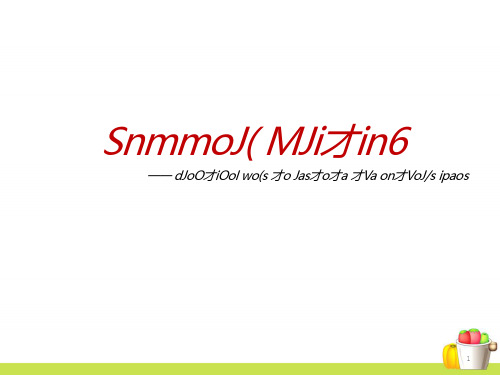

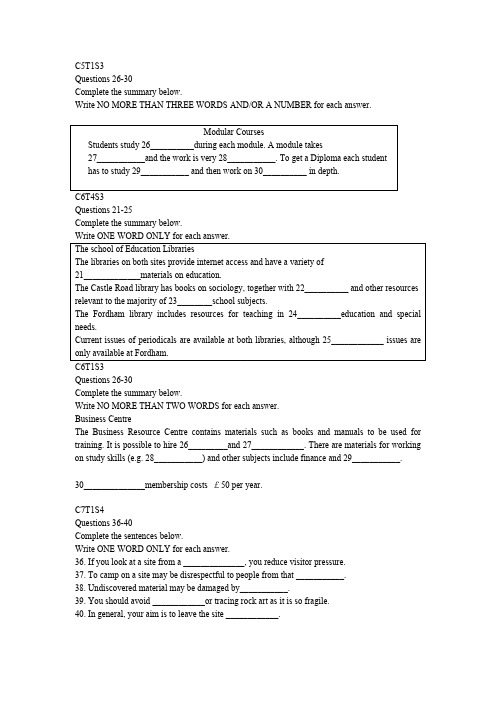


英语说课总结(English lesson summary)The lesson is a fixed link and steps.A textbook, said1. first teaching position, such as * * * * day is the first book the first chapter of the * section, and how to contact (before and after the foundation / application / nexus......)2. said the teaching target, attention is three-dimensional: the goal of knowledge goals, objectives, thinking of emotional target. That heavy and difficultTwo, learn to love, that the students have mastered the knowledge and ability of this class are what help or difficultThree, teaching said, using the method of teaching inFour, learning method, based on the students, to learn the knowledge of what application methodFive, that is the multimedia teaching aids.Six, teaching process (which is the most important, should be accounted for more than half of the practice link time)1. introduction, introduced to the topic from what angle, such as storytelling, watching the video, ask questions......2. specific knowledge link, must be in the said process and teaching objectives and teaching methods corresponding to.Such as: I treat this problem when designing three thinking step by step to guide students to think, which is in order to break through the difficulties in teaching target.3. summarizing4. feedback exercises (this is also very important, not too many lost)Seven, said that teaching reflection, finished the class what do well, what place do, efforts are still needed (if direct presentation, this link not omit the lecture)The seven part is flexible, not necessarily exhaustive, some links can be omitted. But the teaching materials, teaching methods and the teaching process is not the province.Good morning, ladies and gentlemen. It s my great honor and "pleasure to be here sharing my lesson with you.I have been ready to begin this representation with five parts. Analysis of the teaching material, the teaching aims, the important and difficult points, the studying methods, and the teaching procedure.Part 1 Teaching MaterialThe content of my lesson is New Senior English for China Book___ Unit____________________. This unit isabout____________________ (Topics). By studying of this unit we enable students to know_________________________ and lldevelop the interest in___________________. At the same time, let the students learn how to____________________ (functional items). From this lesson, itstarts___________________________ (structures). (As we all know, reading belongs to the input during the process of the language learning. The input has great effect on output, such as speaking and writing. Therefore this lesson is), in the important position of this unit. If the Ss can master it well,这将有助于他们学习本单元的休息。
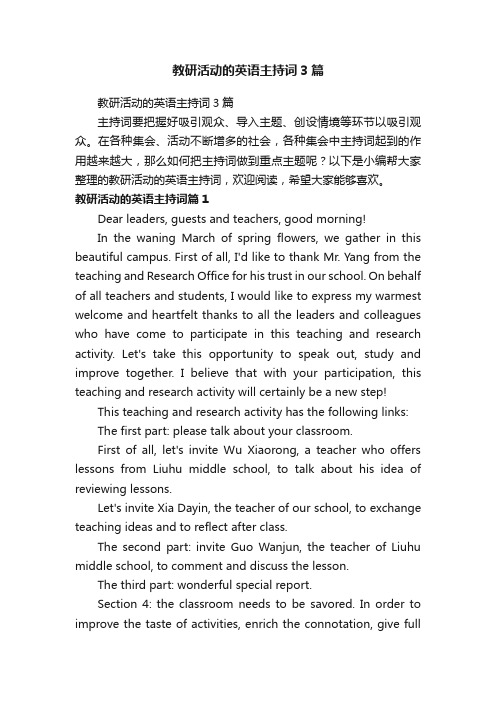
教研活动的英语主持词3篇教研活动的英语主持词3篇主持词要把握好吸引观众、导入主题、创设情境等环节以吸引观众。
在各种集会、活动不断增多的社会,各种集会中主持词起到的作用越来越大,那么如何把主持词做到重点主题呢?以下是小编帮大家整理的教研活动的英语主持词,欢迎阅读,希望大家能够喜欢。
教研活动的英语主持词篇1Dear leaders, guests and teachers, good morning!In the waning March of spring flowers, we gather in this beautiful campus. First of all, I'd like to thank Mr. Yang from the teaching and Research Office for his trust in our school. On behalf of all teachers and students, I would like to express my warmest welcome and heartfelt thanks to all the leaders and colleagues who have come to participate in this teaching and research activity. Let's take this opportunity to speak out, study and improve together. I believe that with your participation, this teaching and research activity will certainly be a new step!This teaching and research activity has the following links:The first part: please talk about your classroom.First of all, let's invite Wu Xiaorong, a teacher who offers lessons from Liuhu middle school, to talk about his idea of reviewing lessons.Let's invite Xia Dayin, the teacher of our school, to exchange teaching ideas and to reflect after class.The second part: invite Guo Wanjun, the teacher of Liuhu middle school, to comment and discuss the lesson.The third part: wonderful special report.Section 4: the classroom needs to be savored. In order to improve the taste of activities, enrich the connotation, give fullplay to the leading and guiding role of experts, and trigger the collision of thinking, we sincerely ask Mr. Yang, the political teaching researcher of the teaching and Research Office, to analyze the pulse of classroom teaching from a professional perspective, and to point out the maze for us.The fifth part: let's welcome President Li Chao to give a speech.Conclusion: if listening to a good lesson is a kind of enjoyment, then listening to experts' comments is a kind of enjoyment. Expert's comment is a kind of diagnosis and encouragement, which is an effective platform to improve the concept, adjust teaching and develop ability. Today we shared the classroom teaching of the ninth grade political review class, the same classroom, the same dream. With the encouragement and comments of the experts, I hope that the teachers will continue to move forward, practice and explore the teaching art. I believe that in the final review sprint, as long as we have more wisdom, less mediocrity, more innovation and less forms, our teaching flowers will be more colorful!Finally, once again, thank you leaders, thank you colleagues, thank you! This concludes today's event.尊敬的各位领导、各位来宾、老师们:大家上午好!在这春花的漫烂三月,我们相聚在这美丽的校园。